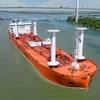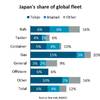Second such cargo in a year - traders; cargo loads from Cherry Point, heading to Botany Bay.
Oil major BP Plc is shipping diesel from the United States to Australia in an unusual shipping flow, several industry sources told Reuters on Thursday.
The Jupiter Express carrying about 35,000 tonnes of diesel loaded from BP's Cherry Point, Washington refinery on June 29 and is currently headed to Botany Bay, New South Wales in Australia, shipping data on Thomson Reuters Eikon showed.
BP declined to comment.
Australia imports most of its diesel requirements from Singapore, South Korea and Japan but several refineries undergoing maintenance and prompt demand from India has tightened supply of the fuel in Asia, traders said.
"The decision was (likely) made due to far east premium strength, Singapore (cash premium) strength versus bringing a vessel down," a trader with a North Asian refiner said.
The cash differential for diesel with 10-parts-per-million (ppm) sulphur, a grade imported by Australia, rose to a six-month high in early July, Reuters data showed. <GO10-SIN-DIF>
BP last shipped diesel from the United States to Australia in December, a shipbroker said, though such cargo movements were unheard of before that.
United States usually ships most of its diesel exports to Europe than Asia due to cheaper freight rates, traders said.
But a rise in Singapore cash premiums for diesel has attracted the unusual reverse arbitrage flow of diesel from Europe to Asia, they added.
BP has chartered the long-range Nan Lin Wan and Front Antares tankers for loading out of the Amsterdam-Rotterdam-Antwerp storage and refining hub in mid-July, headed to Asia, traders and shipbrokers said.
This could also be prompting the unusual flow of diesel cargo from the United States to Australia, the traders added.
"I think going forward, it's going to be more and more common to see this kind of reverse flows as Asian demand for oil products like jet fuel and diesel is growing phenomenally," a Singapore-based trader said.
But the unusual diesel imports could ease in the third quarter as refineries are expected to return from maintenance and as India's imports of the fuel taper off due to the start of monsoon rains which typically reduce the need of the fuel in irrigation pumps.
(Reporting by Jessica Jaganathan; Editing by Amrutha Gayathri)














